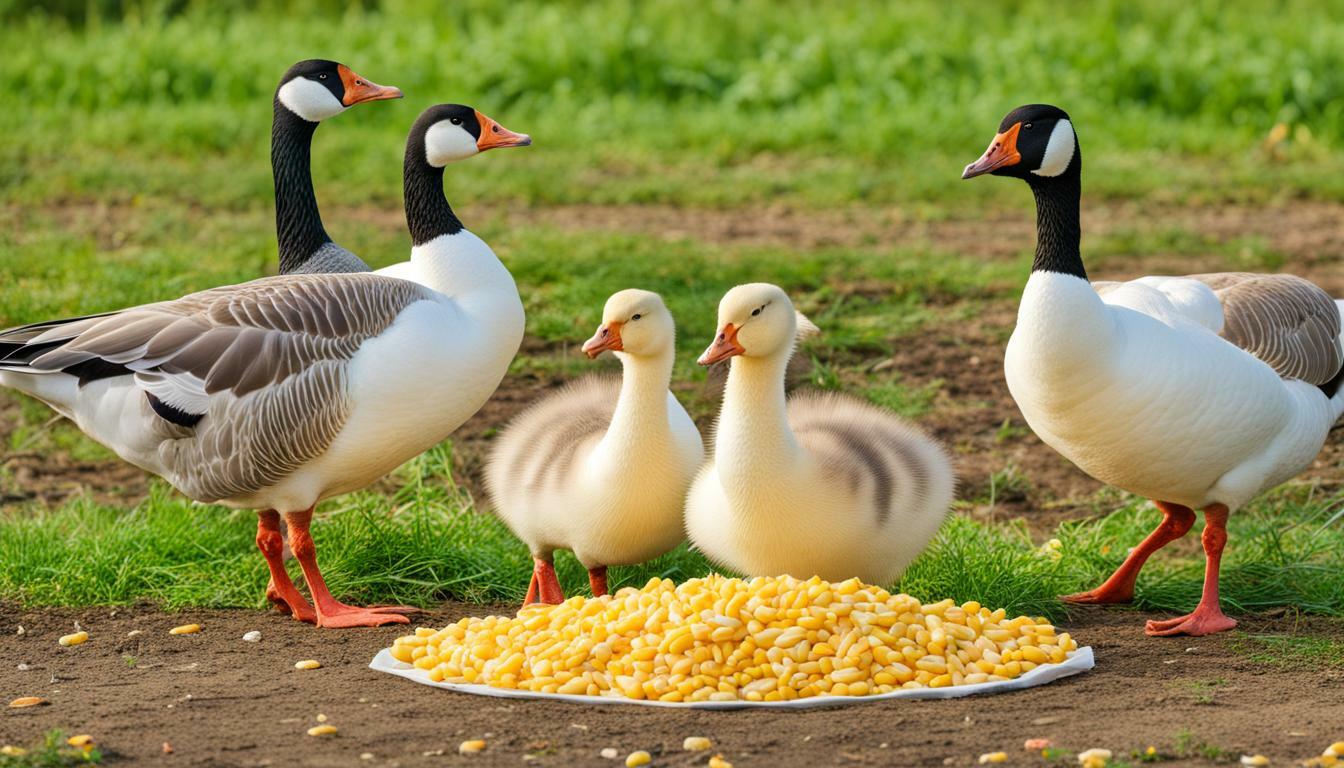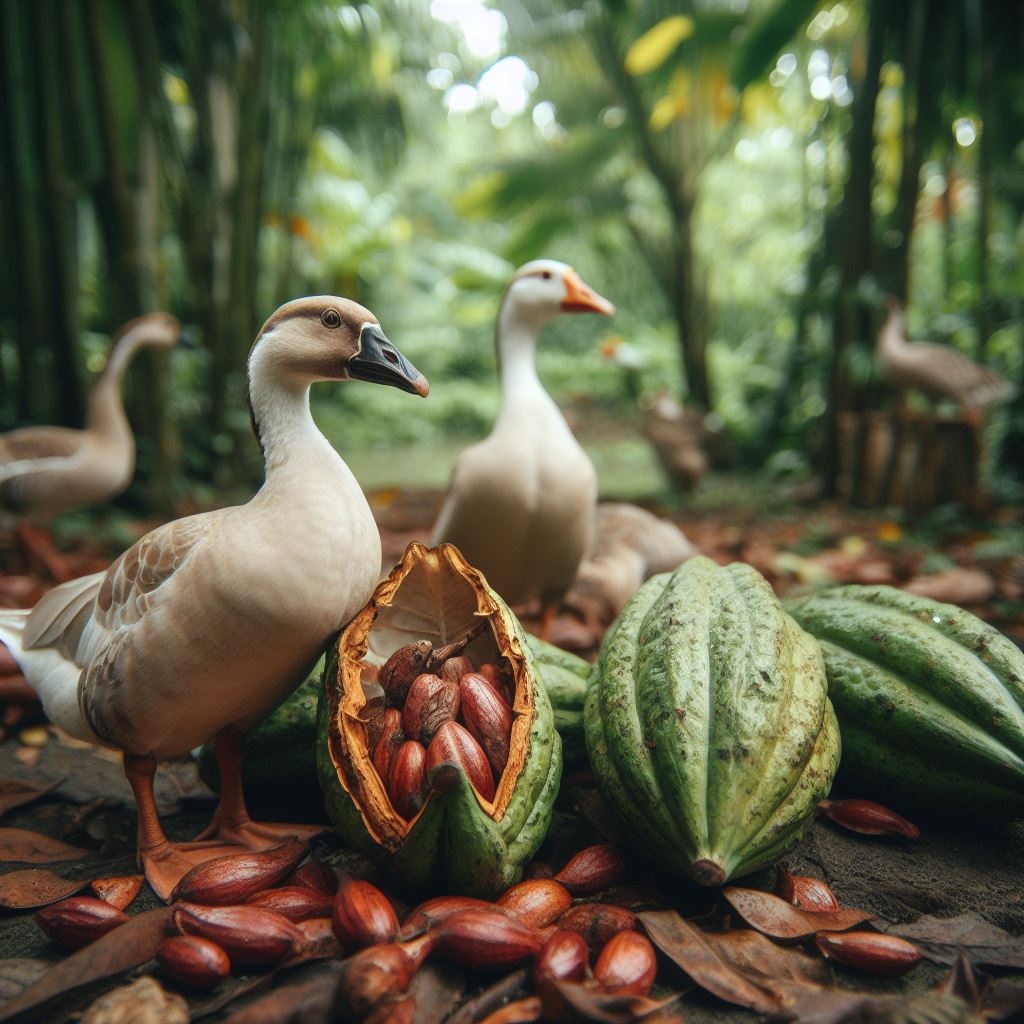Can Geese Eat Corn? Exploring the Diet of Geese

Table of content:
- Geese Diet and Nutrition
- Is Corn Safe for Geese to Eat?
- Feeding Corn to Geese
- Benefits of Feeding Corn to Geese
- How Much Corn Should You Feed Geese?
- What Other Foods Can Geese Eat?
- Risks of Feeding Too Much Corn to Geese
- Raising Geese on Corn Diets
- Are There Any Alternatives to Feeding Corn?
- Can Geese Eat Corn on the Cob?
- FAQs about Geese Eating Corn
- Conclusion
Corn is a common staple food for many people. Its sweet taste makes it popular for human consumption. But what about geese – can they eat corn too?
Geese Diet and Nutrition
Geese are herbivorous birds. Their natural diet consists mainly of grains, grasses, aquatic plants, and some insects.
In the wild, geese look for nutrient-dense foods to meet their dietary needs. They get carbohydrates from grains and seeds. Fiber comes from grasses and greens. Protein sources include plants, larvae, worms, and aquatic insects.
For optimum nutrition, geese require:
- Carbs for energy
- Protein for growth and muscle
- Calcium for bone health
- Niacin, riboflavin, and B12 for metabolism
- Vitamin A for immunity
- Iron for healthy blood and prevention of anemia
Domestic geese that live on farms depend entirely on their caretakers to provide a nutritionally balanced diet.
Is Corn Safe for Geese to Eat?
Yes, corn is completely safe and nutritious for geese to eat.
In fact, corn is a common ingredient in many waterfowl and poultry feeds. It is rich in carbs and protein which geese need.
Here’s a nutritional breakdown of 1 cup of yellow corn:
- Calories: 363
- Protein: 9.4 g
- Carbs: 77 g
- Fat: 4.74 g
- Sugar: 0.64 g
- Fiber: 5.2 g
This shows that corn can provide substantial nutrition for geese.
Both raw and cooked corn can be fed to geese. Though raw corn may be harder for them to digest.
Some key benefits of corn for geese include:
- High energy levels from carbohydrates
- Lean protein for growth
- Vitamins and minerals like niacin, folate, iron
- Fiber for digestion
So corn certainly makes a healthy treat and supplemental food for geese.
Feeding Corn to Geese
When feeding corn to geese, here are some tips to follow:
Choose Good Quality Corn
Select fresh, ripe corn cobs or kernels. Discard any old, moldy, or spoiled corn.
For geese, sweet corn is preferable to field corn. Sweet corn is lower in complex carbs and higher in sugars and vitamins.
Make sure the corn is free of insecticides or other chemicals if you grow your own. Rinse store-bought corn before feeding.
Cook The Corn
It’s best to give cooked corn to geese rather than raw.
Cooking helps release nutrients and softens the kernels. This makes the corn easier to chew and digest.
Boil corn cobs for 15-20 minutes until tender. For a softer texture, you can also roast or steam the corn.
To prepare corn kernels, blanch them for 2-3 minutes until slightly softened but still crunchy.
Chop Into Small Pieces
Chop cooked corn kernels into smaller, bite-sized pieces. You can also finely dice or mash boiled corn cobs.
This makes it safer and easier for geese to eat the corn pieces.
Bite-sized corn prevents choking hazards compared to giving whole kernels or cobs.
Feed As A Treat or Supplement
Corn shouldn’t make up the entire diet of geese. Offer it alongside their regular food.
For geese on a balanced commercial feed, corn can be given as a supplemental treat 2-3 times per week.
Limit the portion to 1-2 tbsp of corn per goose. This provides added nutrition without ruining their appetite for regular feed.
For free-grazing geese, corn can be fed daily but sparingly along with greens, grains, pellets, etc.
Benefits of Feeding Corn to Geese
Here are some of the top benefits geese can get from eating corn:
- Energy – Corn is packed with carbohydrates which provide immediate energy. This helps geese stay active and maintain body heat in cold weather.
- Healthy weight – The protein in corn helps geese develop muscle and achieve a healthy body weight. Corn is lower in fat than many other grains.
- Nutrient intake – In addition to carbs and protein, corn supplies vitamins, minerals, and antioxidants missing from a grass-only diet.
- Digestion – Corn has a good amount of fiber. This supports digestion in geese and helps prevent gut issues.
- Foraging enrichment – Scattering corn offers mental stimulation and satisfies geese’s natural foraging instinct.
- Low cost – Corn is an economical food source compared to other grains. This makes it feasible to feed geese.
So by feeding corn, goose owners can boost their birds’ nutrition, health, and enjoyment.
How Much Corn Should You Feed Geese?
When feeding corn to geese, moderation is key.
Too much corn can lead to health issues in geese if it makes up the bulk of their diet.
Here are some feeding guidelines for corn:
- Adult geese: 1–2 tablespoons of corn per day. Can be given 2-3 times weekly.
- Goslings: 1 tablespoon of finely chopped corn per day. Adjust quantity as they grow.
- Free-grazing geese: 2-3 tablespoons corn scattered over grazing area per day.
- Pet geese: 1–2 tablespoons per day along with commercial pellets.
- Breeding geese: Increase corn in the diet during breeding season to meet energy needs.
Always supervise geese when feeding corn to prevent choking hazards or gorging. Limit corn to 10% or less of their total daily food intake.
For geese receiving a nutritionally balanced feed formula, corn should be an occasional treat rather than a dietary staple.
What Other Foods Can Geese Eat?
In addition to corn, geese can eat a diverse range of foods. This includes:
Grains:
- Wheat
- Oats
- Rice
- Millet
- Barley
Grains give geese an excellent source of carbohydrates and protein. Feeding a grain mixture creates a balanced diet.
Greens:
- Grass
- Lettuce
- Kale
- Spinach
- Watercress
Greens provide vitamin A, vitamin K, antioxidants, and fiber. Grass should make up 60-70% of a goose’s diet.
Fruits and Veggies:
- Chopped melons
- Berries
- Peas
- Squash
- Sprouts
Fruits and vegetables offer natural vitamins, minerals, and juices that geese enjoy. Chop produce into goose-friendly pieces before feeding.
Healthy Snacks:
- Mealworms
- Chopped hard boiled eggs
- Oats
- Seeds
Snacks like these give added nutrition and variety to a goose’s diet. They provide healthy fats, protein, fiber, and texture.
Offer geese a diverse diet with variety for full nutrition. Give grass alongside supplemented grains, veggies, fruits and proteins. Use corn as an occasional treat in moderation.
Risks of Feeding Too Much Corn to Geese
While geese can safely eat corn in moderation, feeding too much can cause problems.
Here are some risks of overfeeding corn:
- Obesity – Corn is high in carbs and calories. Too much can lead to excessive weight gain in geese.
- Vitamin deficiency – Relying solely on corn could deprive geese of vitamins A and D, calcium, and other nutrients not found in corn.
- Fatty liver disease – Excess carbs from corn get stored as fat which could contribute to liver problems.
- Digestive issues – Too much corn is hard for geese to digest fully. This could result in diarrhea, gas, or other gut problems.
- Dehydration – Corn is low in moisture. Filling geese with corn can displace their water intake.
- Malnutrition – Corn lacks adequate protein for development, calcium for bone growth, and nutrients for immunity in young, rapidly growing geese.
- Biofilm on keel – Excess corn in geese diet can promote biofilm growth which needs to be cleaned.
To avoid these risks, feed corn in moderation as part of a balanced diet. Follow proper portion sizes for geese’s age and activity levels.
Raising Geese on Corn Diets
For goose farmers raising flocks, corn can be used strategically in feed rations.
Here are some guidelines on using corn for geese being raised for meat:
- Limit corn to 30% or less of feed blend. Combine with grains like oats, wheat, and barley.
- Reduce corn and increase pellets in starter feed for goslings. They need more protein for growth.
- Slowly transition geese onto higher corn rations as they mature.
- Give free access to grass, hay, or grazing pasture in addition to corn feed.
- Supplement with a vitamin premix, calcium source, and amino acids.
- Avoid corn in breeder diets. Use high-protein feed for fertility.
With the right ratios and supplements, corn can help raise strong, healthy geese for agricultural production. But it shouldn’t be the sole component of their diet at any stage.
Are There Any Alternatives to Feeding Corn?
For geese owners who want to avoid corn, there are plenty of alternatives. Some options include:
- Wheat: High in protein and fiber. Softer kernels than corn when cooked.
- Oats: Lower glycemic index than corn. Rich in fiber, iron, and protein. Gentler on digestion.
- Millet: Tiny yellow seeds packed with vitamins, minerals, and amino acids. Mild flavor.
- Barley: Helps control weight. Contains amino acids for muscle growth. Lower calorie option.
- Brown rice: Whole grain with vitamin B, magnesium, and phosphorus. Low risk of allergies.
- Sorghum: Protein-rich ancient grain. Contains iron, fiber, and antioxidants. Gluten-free.
There are many nutritious grains and seeds that can be alternated in place of corn in geese diet. Try mixes for balanced nutrition.
Can Geese Eat Corn on the Cob?
Whole corn cobs may seem like a fun treat for geese. However, geese should not be given entire corn cobs to eat.
Risks of feeding geese corn on the cob include:
- Choking hazard from getting whole kernels stuck in throat
- Difficulty digesting the cob wood fiber
- Undigested kernels passing through gut cause impaction
- Size and shape can lead to mouth injuries
For safety, it’s best to avoid feeding geese corn straight off the cob. Instead, boil or grill corn cobs. Then slice off the kernels and chop them into bite-size pieces for geese.
This allows them to enjoy the flavor of corn without the risk of swallowing it directly on the cob.
FAQs about Geese Eating Corn
Here are answers to some common questions about feeding corn to geese:
Can baby geese eat corn?
Yes, goslings can eat corn. Chop boiled corn kernels very finely into swallow-safe pieces. Start with 1 tsp per gosling and slowly increase portion sizes as they grow.
Should you soak corn for geese?
Soaking helps soften the kernels but isn’t necessary. Boiling or steaming corn makes it easy for geese to digest.
Can you give geese raw corn?
It’s best to cook corn before feeding to geese. Raw corn is harder to break down and risks internal injury. Geese may reject chewing tough, uncooked kernels.
Is corn good for goose eggs?
Corn contributes healthy fats, protein, and nutrients for egg production. But too much can lead to fatty liver issues. Use corn in moderation along with a balanced breeder diet.
Does corn impact goose poop?
Overfeeding corn could cause loose stool or diarrhea in geese. But in moderation, corn provides fiber for healthy digestion and poop.
Will geese get bored of corn?
For variety, switch between corn and other grains like wheat, barley, and oats. Combining with greens and pellets will also prevent boredom.
Can you feed geese creamed corn?
Creamed corn should be avoided as the milk and sugar content could cause digestive upset. Stick to fresh, plain corn.
Conclusion
In conclusion, corn is a nutritious grain that is perfectly safe for geese to eat. The carbohydrates, protein, vitamins and minerals in corn can contribute valuable nutrition to geese’s diets. Both raw and cooked corn can be fed, but cooking softens the kernels for easier eating and digestion. To maximize benefits while preventing risks of overfeeding, corn should be fed in moderation alongside a balanced diet.
Follow suggested portion sizes for geese’s age and activity level. Bulk up their diet with grass, greens, pellets and other grains. Limit corn to occasional treats instead of a dietary staple. With proper feeding practices, corn can provide energy, nutrition and enjoyment for domestic geese.
Welcome. I’m Adreena Shanum, the proud owner of this website, and I am incredibly passionate about animals, especially poultry. I founded adreenapets.com as a labor of love, stemming from my desire to share my knowledge and experiences with poultry enthusiasts worldwide.



